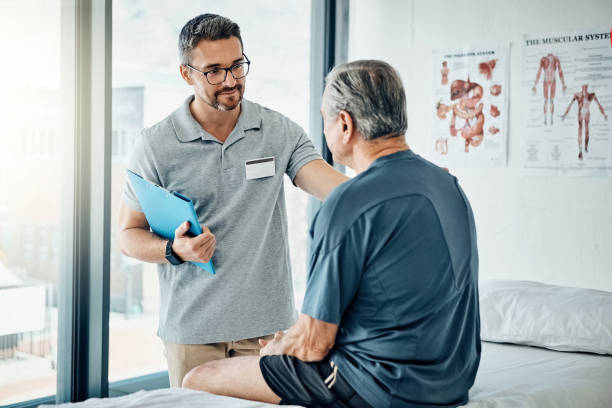
MEN’S URINARY DISORDERS
Urinary disorders affect millions of men, but only a small percentage talk to their doctors about it. If you’re like many men, you have experienced some changes in your urination or even had problems urinating as you’ve gotten older, you should see a professional in this area, either a check up with your GP or an appointment with our physiotherapist who specialises in this area. It is essential men know how to perform pelvic floor muscle contractions correctly and understand how frequently and intensely they need to undertake them to achieve the best results. The main types of incontinence are:
Stress Incontinence
Stress Incontinence refers to bladder leakage during activities that increase pressure in the abdomen and bladder. Coughing, sneezing, laughing, jumping, and lifting activities can all cause the dribbling of urine that occurs when the body is in motion. This condition can have an incredibly negative effect on the quality of life as sufferers seek to hide the embarrassment of ‘wetting themselves’.
Treatment can include Medication, behavioural therapy, physical therapy, or surgery.
Urge Incontinence
Urge Incontinence is the sudden urge to urinate, even if your body doesn’t need to empty your bladder. The condition impacts the signals between the bladder and the brain, and affects the bladder’s natural ability to communicate when it is full. On the other hand, your bladder might tell your brain it needs to empty when it isn’t full, leading it to be triggered by something like a change of position or the sound of running water.
Treatment can include Medication, behavioural therapy, physical therapy, or surgery
Overflow or Overactive Bladder
An overactive bladder is caused by a combination of the number of times you visit the bathroom, your urgency to urinate, and nocturia (waking up in the night to urinate).
Treatment can include Medication, behavioural therapy, physical therapy, or surgery
Neurogenic bladder
This is caused by neurological illness such as spinal cord injury, Parkinson’s disease or multiple Sclerosis.
Symptoms Urine loss
Treatment Physical therapy, medication, Botox, and nerve stimulation procedures
Nocturia
A recurrent need to urinate during night which disrupts your sleep.
Symptoms Urinating more than 2 times a night, urinary tract infections
Treatment Physical therapy, medication, surgery (sling procedure)
Interstitial cystitis
Interstitial cystitis (painful bladder syndrome) is a condition that results in recurring discomfort or pain in the bladder and the surrounding pelvic region.
Symptoms Urinary frequency, pain or pressure in and around the bladder, sexual dysfunction or pain with intercourse.
Treatment Medication, physical therapy, electrical nerve stimulation
